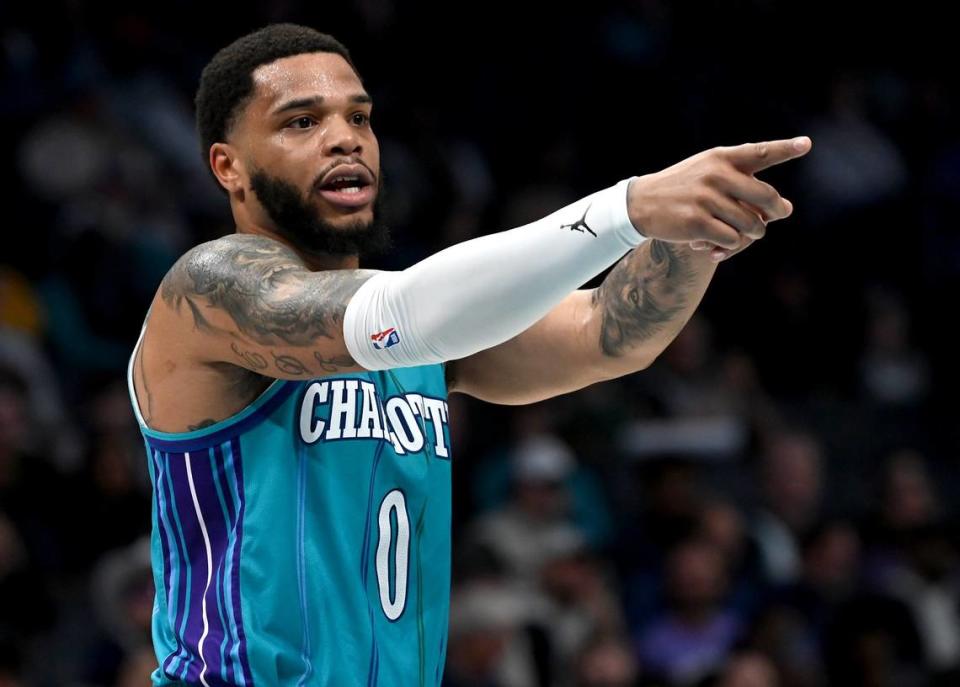Charlotte Hornets’ key offseason roster moves hinge on what happens with Miles Bridges
An unsolicited call came in, checking on potential future transactions.
The voice on the other end had the same question that’s been on the minds of those who follow the Charlotte Hornets for months, even more so now after an impressive season as the team’s most durable and reliable player. Seven words roll off the tongue, repeating a phrase that’s become interwoven in the daily lexicon.
“What’s going to happen with Miles Bridges?” the league source asked.
Even when inquiring about how the roster may eventually shake out, trying to decipher which under-the-radar free agents could be an option for the Hornets, the conversation starts in similar fashion.
“It all depends on what happens with Miles,” another league source said.
That’s the situation the Hornets find themselves in leading into the NBA’s most active period on its offseason calendar, which tips off with the June 26-27 draft. Their direction hinges on Bridges in a major way and they can’t completely move forward until there’s clarity with the 26-year-old’s future.
Bridges is an unrestricted free agent after betting on himself and signing a one-year $7.9 million tender rather than a long-term deal after missing the entire 2022-23 season following his no contest plea to felony domestic violence.
He’s going to command a hefty salary on the heels of his best season statistically, averaging career bests in points (21), made field goals (8.1), 3-pointers (2.3), 2-pointers (5.8), total rebounds (7.3) and defensive rebounds (6.3).
But at least there’s a wrinkle which may help the Hornets out.
Under the terms of the new collective bargaining agreement, teams are now allowed to commence discussions with their own free agents on the next day after the NBA Finals conclude. Previously, it wasn’t permitted until the new league year began. This year, teams can’t negotiate with other free agents until 6 p.m. on June 30, giving the Hornets an edge.
So, unless the Finals goes a full seven games, the Hornets would be able to start talks with Bridges and his representatives sometime next week, possibly as early as Tuesday or late as Friday depending on how things go between Boston and Dallas.
Money is tight
Why does Bridges hold the key to Charlotte’s offseason?
Currently constituted, the Hornets don’t have much salary cap space and aren’t projected to get any significant relief unless they make some changes.

Given the current salary structure, Bridges’ cap hold of $15 million paired with the $7.5 million salary slotted for the No. 6 overall pick in the draft later this month eats up a bulk of the space. The holds are essentially placemarkers, occupying a spot on a team’s cap sheet.
Per Spotrac, depending on certain roster decisions, the Hornets could be looking at anywhere between $5 million to $30 million in salary cap space at their disposal, with the latter coming if Bridges walks and signs elsewhere, leaving Charlotte without any compensation in return.
Cutting loose some of the players with non-guaranteed contracts on the back end of the roster could give the Hornets some additional space. Davis Bertans’ decision will have an impact on their cap ($16 million/partially guaranteed; player holds early termination option this summer), and they could elect to move forward without a some combination of the non-guaranteed contracts of Aleksej Pokusevski ($2.2 million), JT Thor ($1.9 million) and Bryce McGowens ($2.1 million).
There’s also another route the Hornets could potentially take, utilizing an avenue they’ve haven’t typically traveled: cashing in one of their exceptions. They can offer either the non-taxpayer mid-level of $12.8 million per season or the bi-annual of $4.6 million — but not both.
The Hornets also have another exception, courtesy of one of their transactions four months ago. They received a $442,000 trade exception as part of the deal sending PJ Washington to Dallas in exchange for Grant Williams, Seth Curry and a 2027 first-round pick. The exception expires in February.
Got all that?
No matter how it’s dissected, though, the common denominator doesn’t change: Bridges holds the car keys and is in complete control of the direction the Hornets are about to embark on. He’s in the driver’s seat, reclining in cushy comfort while deciding what the future has in store for him and the franchise trying to end the NBA’s longest postseason drought.

